
Project Title
Code: 1.14
Building Aquafeeds R&D Capacity for Intensive Aquaculture
in Vietnam
Australian Personnel Dr Kevin C Williams
Australian Institution CSIRO Division of Marine Research
Vietnam Institution University of Fishery
Project Duration July 2000 to June 2002
Project Description
The overall objective of the project is to increase food security and income of rural
Vietnamese in coastal communities by improving the profitability, and environmental
sustainability, of intensive aquaculture in Vietnam. This addresses identified priorities of the
CARD Program to build capacity in areas of fisheries and aquaculture and livestock feed
improvement. This will be delivered by building the teaching and research base for
aquaculture nutrition at the University of Fisheries (UoF) at Nha Trang.
By developing this capability, aquaculture nutritional research carried out in Vietnam will
develop cheaper, better and more environmentally responsible aquafeeds.
Additionally, aquaculture graduates and postgraduates in Vietnam will become more
proficient in aquaculture.
Objectives
Aquaculture graduates and postgraduates in Vietnam will become more proficient in
aquaculture feed technology with this knowledge being applied for long term benefits to
Vietnamese culture. Through these mechanisms, intensive aquaculture in Vietnam will
become more ecologically sustainable and profitable.
Australia will derive benefit through complementary research being carried out to develop
formulated pelleted diets for the on-growing of tropical rock lobsters - an emerging
aquaculture industry in Australia. These outcomes will be achieved by:
a) Developing a collaborative aquafeed research project between CMR and UoF to facilitate
technology transfer between Australia and Vietnam for the mutual benefit of aquaculture
sectors of both countries
b) Providing training to increase the aquaculture nutrition skill base at UoF and to provide
Vietnamese post-graduates with opportunities to study aquaculture nutrition.
c) Disseminating and show-casing project achievements at scientific forums, by the holding
of a technical workshop in Vietnam and extension of research findings to the aquaculture
industry.
1

Outputs and Performance indicators
Outputs
Performance Indicators
UoF Outputs
♦
♦
♦
♦
♦
Audit of feeding practises used in the
intensive culture of tiger shrimp, grouper
and lobster in central/southern coastal
Vietnam
Inventory of manufactured aquafeed and
feedstock supplies available in
central/southern coastal Vietnam
Database on the biochemical composition of
aquafeeds and agricultural/fishery
commodities identified as having significant
potential for use in pelleted aquafeeds.
Guidelines for the improved use of trash fish
for intensive culture of grouper and rock
lobster
Capability at UoF to undertake aquafeeds
R&D
CMR Outputs
♦
♦
♦
Highly attractive/palatable pelleted diets
developed that stimulate food consumption
and promote growth and development of
juvenile tropical rock lobsters
Nutritionally-balanced pelleted diets for
growth and development for juvenile rock
lobsters developed
Pelleted diets for tropical rock lobster that
have a low resilience on fishery product
Increasing the aquaculture nutrition skill base
at UoF
♦
♦
♦
♦
Research facilities developed at UoF for
aquaculture nutrition research
UoF staff trained in aquaculture nutrition
research methodology
Curriculum developed for undergraduate
teaching of aquaculture nutrition at UoF
Postgraduate studies in aquaculture nutrition
at UoF
i) Scheduled project activities are
completed on time (staff employed,
facilities established and experiments
completed)
ii) AusAID is provided with reports
of project activities at six-monthly
intervals and the final report by 31
August 2002
iii) Improved trash fish feeding
practises for intensive grouper and
lobster culture are being adopted in
Vietnam
iv) Pelleted diet are developed that
enable juvenile tropical rock lobsters to
grow at rates equal to or better than that
achieved with natural foods
v) The requirements of rock lobsters
for high-cost nutrients are determined
vi) Training UoF personnel in
aquaculture nutrition research
methodology and nutritional chemistry
analysis is provided by CMR through
staff exchange visits and supervision of
postgraduate students
vii) Research findings are widely and
speedily communicated to industry and
the scientific forums and the holding of
a workshop in Vietnam to report project
activities
2

Disseminate project findings
♦
♦
Papers and extension aids reporting project
findings to the scientific community and to
industry
Workshop in Vietnam to show-case and
publicise project findings
viii) Aquafeed manufacturers in
Vietnam use project findings to develop
improved pelleted feeds, especially for
shrimp and grouper culture.
PROJECT COMPLETION REPORT
Executive Summary
The aim of the CARD Project was to build increased capacity for aquafeed development in
Viet Nam. This was achieved through the training of University of Fisheries (UoF) staff and
post-graduates in aquaculture nutrition and the initiation of collaborative research with CMR
on feed development for grouper fish. In Viet Nam, the research work forms part of a PhD
study being undertaken by Le Anh Tuan at UoF; Ms Mai Nhu Thuy is enrolled for a Master
of Aquaculture with aquaculture nutrition her nominated specialty study.
All milestones for the Project, which officially ends 30 June 2002, have been met. However,
ongoing research work by Le Anh Tuan to fulfill requirements for his PhD, including a
further 3-month placement at CMR from July to September 2002 and in-Australia training of
Master’s postgraduate Ms Mai Nhu Thuy at Cleveland during August 2002, will provide
ongoing communication and collaboration between CARD staff at both Centres. The CARD
project has enabled a fully equipped feeds processing and seawater nutritional research
laboratory to be constructed at UoF at a materials and equipment cost of about AUD$55,000.
This facility will remain to support ongoing aquaculture nutrition research at UoF.
Training of UoF staff in aquaculture nutrition has been an essential part of the CARD Project.
In addition to the on-going supervision of postgraduate studies being undertaken by Mr Tuan
and Ms Thuy, dedicated in-country and in-Australia training has been provided by CMR
staff: in-country training in feeds processing and fish nutritional experimentation was
provided by Mr Simon Tabrett in March 2001; Mr Tuan received training in all facets of
aquaculture nutrition during 3 to 4 month placements at CMR in 2001 and 2002; Ms Binh
spent 3 weeks at CMR in August 2001 for training in nutritional analytical chemistry and this
was consolidated with in-country training in gas chromatographic procedures for analyzing
fatty acids provided by Ms Margaret Barclay in April 2002. Ms Thuy will visit CMR in
August 2002 for training in seawater laboratory procedures.
The key nutritional requirements of grouper have been determined and pelleted feeds based
on the use of dried marine and terrestrial feed ingredients have been developed and shown to
be equally as good for feeding grouper as traditional feeds of ‘wet’ trash fish. Dr Mao (UoF
Project leader) and Mr Tuan, together with CMR staff, Dr Kevin Williams, David Smith and
Simon Irvin, will attend and contribute papers at a marine finfish workshop being held 30
September to 04 October 2002 at Halong City, Viet Nam. This meeting will provide an ideal
forum to showcase the research carried out in the CARD project and to extend these findings
to the Vietnamese aquaculture feeds industry. Additionally, research carried out jointly in
the CARD and an ACIAR grouper aquaculture project, is to be showcased at a large ACIAR
Fisheries Expo being staged in Jakarta, Indonesia, from 28 to 30 July 2002.
3

The CARD Project has successfully equipped UoF with excellent aquaculture nutrition
research facilities and increased the skill base of its staff in this discipline. It is expected that
aquaculture nutrition will now become a more important undergraduate course at the
university and that the university will offer postgraduate studies in this area. This outcome
was possible only through the strong support for the CARD Project by the University’s
Rector, Professor Dr Quach Dinh Lien and the willing participation of all Project staff.
However, for there to be a long-lasting outcome and real progress in self-determined
aquafeed development in Viet Nam, the present achievements of the CARD project need to
be consolidated through carriage by the University of continued teaching of aquaculture
nutrition to undergraduates and postgraduates and for proactive research in aquaculture
nutrition. It is recognized that a sustained effort in aquaculture nutrition at UoF may not be
possible without additional external funds.
1. Project Description
1.1 Background and preparation
The project arose directly as a result of an Aquaculture Feeds Consultancy for Cage
Mariculture in Khanh Hoa Province, Viet Nam that Dr Williams, CSIRO Marine Research
(CMR), carried out in January 2000. The consultancy was commissioned by the Asian
Institute of Technology, Bangkok (AIT) and supported financially by the Department for
International Development, UK (DFID) and the Australian Centre for International
Agricultural Research (ACIAR). The Consultancy complemented a DFID project on
Improved Management of Small-scale Tropical Cage Culture Systems in Asia, which in Viet
Nam involved the University of Fisheries (UoF). The objectives of the aquaculture feeds
consultancy were to appraise the efficiency and effectiveness of feeding practices currently
employed in the cage culture of rock lobsters and groupers in Viet Nam’s Khanh Hoa
province, and to make recommendations as to how better feeds and feeding practices could
be instituted for the long-term sustainability of these industries.
Cage mariculture in Viet Nam depended entirely on the feeding of fresh fish and shellfish
(trash fish). The employed feeding practices were highly inefficient with up to 30 kg of trash
fish being used to produce 1 kg of cultured grouper or rock lobster. Since only 4 to 5 kg of
trash fish should be needed biologically to produce 1 kg of cultured ‘fish’, a 4 to 6 fold
wastage of the food was occurring which not only affected profitability but was having
severe environmental impacts on the adjacent waterways. Moreover, decreasing fishery
production due to heavy exploitation of inshore fisheries and aquaculture’s increasing
demand for trash fish were causing fish prices to escalate and greater competition between
‘man’ and aquaculture for the decreasing supply. One of the recommendations arising from
the aquafeeds consultancy was for UoF to develop an aquaculture nutrition capability in
order to provide the teaching and research base in aquafeeds technology needed for
ecologically sustainable expansion of intensive mariculture in Viet Nam. The CARD project
was developed to address this need.
1.2 Context and rationale
UoF is the only university in Viet Nam solely dedicated to the tertiary teaching of fisheries
science. Although having a strong School of Aquaculture, teaching staff at UoF had very
little expertise in aquaculture nutrition and undergraduates were given only a rudimentary
course in nutrition. The CARD Project provided an opportunity to address this inadequacy.
The greatest priority was to train staff in aquaculture nutrition and the best way of achieving
this goal in the limited time available in the CARD Project was to initiate a program of
4

aquafeeds research at UoF that could be integrated with on-going research at CMR. This
approach would enable training needs of staff to be identified and targeted training provided
to address this need while ensuring that additional infrastructure was provided for long-term
capacity building in aquaculture nutrition. If successful, the CARD Project would increase
the aquaculture nutrition skill base of staff at UoF and provide the university with long term
benefits well after the CARD Project was completed.
1.3 Project objectives and scope at design
The key activity of the CARD project was to establish a collaborative aquaculture research
project between CMR and UoF. This collaboration would afford opportunities for UoF staff
and post-graduate students to increase their competency for carrying out scientifically
rigorous and meaningful aquaculture nutrition research. The collaboration would provide
Viet Nam with an increased capacity in aquaculture nutrition to enable continued and
ecologically sustainable development of intensive aquaculture in the country. At UoF, the
research sought to develop best feeding practices for using bait/trash fish as a food source for
intensive marine cage aquaculture and subsequently, to initiate research to reduce the reliance
of these intensive aquaculture industries on feeding trash fish. The research at UoF was seen
to complement grow-out feeds development work being done in an ACIAR grouper project
(FIS/97/73: Improved hatchery and grow-out technology for grouper aquaculture in the
Asia-Pacific region) at CMR and in participating laboratories in Indonesia and the
Philippines. Findings from the ACIAR research would have immediate relevance and
transferability to Viet Nam. It was intended that the Australian research element would focus
on pelleted feeds development for tropical rock lobster as a complement to an Australian
Fisheries Research and Development Corporation (FRDC) project that is investigating the
nutritional requirements of the tropical spiny lobster, Panulirus ornatus. The same species is
being intensively cultured in Viet Nam but with a total reliance on the feeding of fresh
(natural) foods.
1.4 Implementation arrangements
Overall project management was the responsibility of CMR’s Dr Williams with in-country
work the responsibility of UoF’s Aquaculture Faculty Head, Dr Nguyen Dinh Mao. Progress
of the Project was tracked by frequent visits by Dr Williams to UoF and regular staff
exchanges between the two Agencies. Key staff of the Project attended the annual project
meeting of the ACIAR Grouper Aquaculture Project which provided a further learning
experience in the way aquaculture research is conducted and reported. Reporting of CARD
progress was organized by requiring UoF to provide CMR with a written report of project
activities and financial acquittal every 6 months. CMR provided AusAID (through Illawarra
Technology Centre) with 6-monthly reports of the Project’s Progress and annual financial
acquittals.
2. Appropriateness of Project Design and Objectives
2.1 Appropriateness of Objectives
Obj No. Objective Description Rating
1 Develop a collaborative aquafeed research project between CMR and UoF
to facilitate technology transfer between Australia and Viet Nam
5
2 Provide training to increase the aquaculture nutrition skill base at UoF 5
3 Disseminate and show-case project achievements 5
5

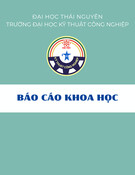
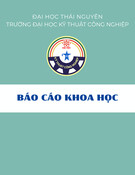
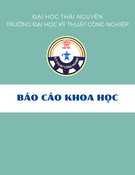
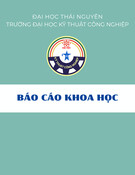
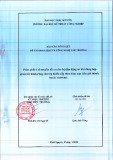
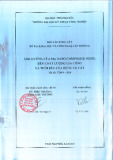
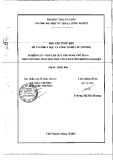











![Bộ Thí Nghiệm Vi Điều Khiển: Nghiên Cứu và Ứng Dụng [A-Z]](https://cdn.tailieu.vn/images/document/thumbnail/2025/20250429/kexauxi8/135x160/10301767836127.jpg)
![Nghiên Cứu TikTok: Tác Động và Hành Vi Giới Trẻ [Mới Nhất]](https://cdn.tailieu.vn/images/document/thumbnail/2025/20250429/kexauxi8/135x160/24371767836128.jpg)





